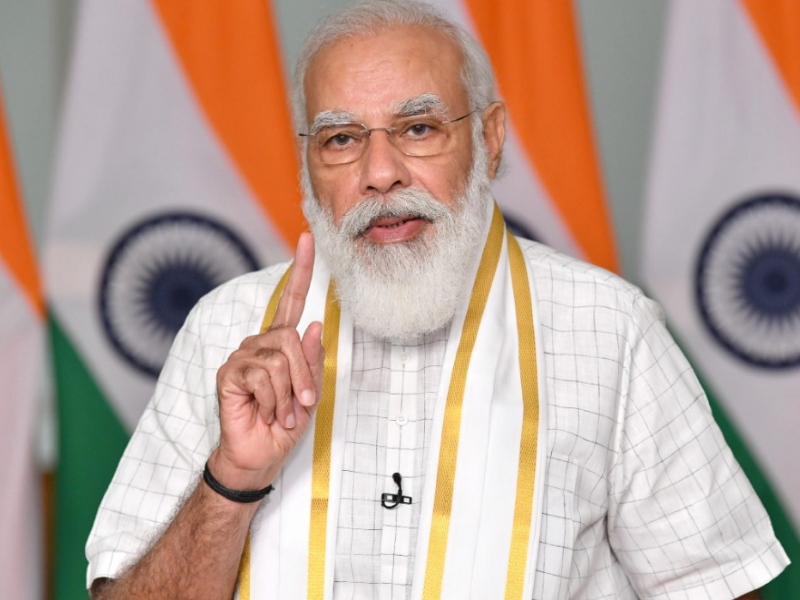Prime Minister Narendra Modi: New Education Policy will lay foundation of New India
“The NEP has given special focus on the areas to ensure India is a superpower and is at the new heights of development and provides the people of India with new and best opportunities.
On 29 July 2020, the Union Cabinet of India chaired by the Prime Minister Narendra Modi approved approved the National Education Policy 2020. The new policy aims to pave way for transformational reforms in school and higher education systems in the country. This policy will replace the 34-year old National Policy on Education (NPE),1986.
Highlighting that the new National Education Policy (NEP) is the need of the hour, Prime Minister Narendra Modi said that Indian youth need to develop critical and innovative thinking.
“In recent years, there have not been major changes in education and thus the values of curiosity and imagination were not given the thrust. Instead, we moved towards a herd community. The mapping of interest, ability, and demand was needed. We need to develop critical thinking and innovative thinking abilities in our youths. It will be possible if we have purpose, philosophy, and passion of education,” the Prime Minister said while addressing a conclave on ‘Transformational Reforms in Higher Education under National Education Policy.
He said the New Education Policy will lay the foundation of New India of the 21st century. “It will give our youth the education and skill-set they need. The NEP has given special focus on the areas to ensure India is a superpower and is at the new heights of development and provide the people of India with new and best opportunities.”
He also said that the New Education Policy will focus on teachers’ training. “I believe, when a teacher learns, the national leads.”
“NEP has given rise to a healthy debate and the more we discuss and debate the more it will benefit the education department. It is palpable that questions will arise on how this huge plan will be implemented. We all will together do this implementation. Each one of you is directly involved in implementation of the NEP. In terms of political will, I am totally committed and with you,” the Prime Minister said.
“Till now, we have focused on what to think but NEP 2020 focuses on how to think. In the time when there is a flood of information and content. It is important that we know which information is necessary and which is not. We need inquiry-based, discovery-based, and analysis-based modes of teaching. This will increase the interest to learn and participate in class,” Prime Minister Modi added.
“We need to make our students into global citizens and yet be rooted in their culture. The learning power of students will improve if the language they speak in and the language in which lessons are taught in school is the same. That is why we have recommended teaching in the mother tongue as soon as possible, at least class 5. This will strengthen their foundation” he said.
“Often students find that what they have learned is not in line with their job. Thus, to give flexibility to students we have given multiple entries and exit points. We have also freed education from the stream system. Students will have the flexibility to change their course if they do not think it is right for them. We are moving from thinking when a person is not glued to one profession for the entire lifetime and hence s/he needs to skill, re-skill and up-skill. These issues are part of NEP,” the Prime Minister added.
Highlights of New Education Policy
School Education
- New Policy aims for universalization of education from pre-school to secondary level with a 100 % Gross Enrolment Ratio (GER) in school education by 2030.
- NEP 2020 will bring 2 crores out of school children back into the mainstream through an open schooling system.
- The current 10+2 system to be replaced by a new 5+3+3+4 curricular structure corresponding to ages 3-8, 8-11, 11-14, and 14-18 years respectively. This will bring the hitherto uncovered age group of 3-6 years under the school curriculum, which has been recognized globally as the crucial stage for the development of the mental faculties of a child. The new system will have 12 years of schooling with three years of Anganwadi/ pre-schooling.
- Emphasis on Foundational Literacy and Numeracy, no rigid separation between academic streams, extracurricular, vocational streams in schools ; Vocational Education to start from Class 6 with Internships
- Teaching up to at least Grade 5 to be in mother tongue/ regional language. No language will be imposed on any student.
- Assessment reforms with 360-degree Holistic Progress Card, tracking Student Progress for achieving Learning Outcomes
- A new and comprehensive National Curriculum Framework for Teacher Education, NCFTE 2021, will be formulated by the NCTE in consultation with NCERT. By 2030, the minimum degree qualification for teaching will be a 4-year integrated B.Ed. Degree.
Higher Education
- Gross Enrolment Ratio in higher education to be raised to 50 % by 2035; 3.5 crore seats to be added in higher education.
- The policy envisages broad-based, multi-disciplinary, holistic Under Graduate education with flexible curricula, creative combinations of subjects, integration of vocational education, and multiple entries and exit points with appropriate certification. UG education can be of 3 or 4 years with multiple exit options and appropriate certification within this period.
- Academic Bank of Credits to be established to facilitate Transfer of Credits
- Multidisciplinary Education and Research Universities (MERUs), at par with IITs, IIMs, to be set up as models of best multidisciplinary education of global standards in the country.
- The National Research Foundation will be created as an apex body for fostering a strong research culture and building research capacity across higher education.
- Higher Education Commission of India (HECI) will be set up as a single overarching umbrella body for entire higher education, excluding medical and legal education. HECI to have four independent verticals – National Higher Education Regulatory Council (NHERC) for regulation, General Education Council (GEC) for standard-setting, Higher Education Grants Council (HEGC) for funding, and National Accreditation Council (NAC) for accreditation. Public and private higher education institutions will be governed by the same set of norms for regulation, accreditation, and academic standards.
- Affiliation of colleges is to be phased out in 15 years and a stage-wise mechanism is to be established for granting graded autonomy to colleges. Over a period of time, it is envisaged that every college would develop into either an Autonomous degree-granting College or a constituent college of a university.
Others
- An autonomous body, the National Educational Technology Forum (NETF), will be created to provide a platform for the free exchange of ideas on the use of technology to enhance learning, assessment, planning, administration.
- NEP 2020 emphasizes setting up of Gender Inclusion Fund, Special Education Zones for disadvantaged regions and groups
- New Policy promotes Multilingualism in both schools and higher education. National Institute for Pali, Persian, and Prakrit, Indian Institute of Translation and Interpretation to be set up
- The Centre and the State Governments will work together to increase the public investment in the Education sector to reach 6% of GDP at the earliest.”
Portuguese:
Primeiro-ministro Narendra Modi: Nova Política de Educação (NEP) estabelecerá as bases da Nova Índia
“A NEP deu ênfase especial às áreas que garantirão que a Índia seja uma superpotência, esteja em novos patamares de desenvolvimento e forneça ao povo da Índia novas e melhores oportunidades.
Em 29 de julho de 2020, o Gabinete da União da Índia, presidido pelo primeiro-ministro Narendra Modi, aprovou a Política Nacional de Educação 2020. A nova política visa abrir caminho para reformas transformacionais nas escolas e nos sistemas de ensino superior do país. Essa política substituirá a Política Nacional de Educação (NPE), com 34 anos, de 1986.
Destacando a urgência da nova Política Nacional de Educação (NEP), o primeiro-ministro Narendra Modi disse que os jovens indianos precisam desenvolver um pensamento crítico e inovador.
“Nos últimos anos, não houve grandes mudanças na educação e, portanto, os valores da curiosidade e da imaginação não foram impulsionados. Em vez disso, mudamos para uma comunidade de rebanho. O mapeamento de interesse, habilidade e demanda era necessário. Precisamos desenvolver o pensamento crítico e habilidades inovadoras de pensamento nossos jovens. Isso será possível se tivermos propósito, filosofia e paixão pela educação”, disse o primeiro-ministro durante um conclave sobre Reformas Transformacionais no Ensino Superior no âmbito da Política Nacional de Educação.
Ele disse que a Nova Política de Educação estabelecerá as bases da Nova Índia do século 21. “Isso dará aos nossos jovens a educação e o conjunto de habilidades de que precisam. A NEP deu um foco especial nas áreas para garantir que a Índia seja uma superpotência, esteja em novos patamares de desenvolvimento e forneça ao povo da Índia novas e melhores oportunidades.”
Ele também disse que a Nova Política de Educação terá como foco a formação de professores. “Eu acredito que, quando um professor aprende, o país lidera.”
“A NEP deu origem a um debate saudável e, quanto mais discutimos e debatemos, mais beneficiará o departamento de educação. É palpável que surgirão questões sobre como esse grande plano será implementado. Todos nós faremos essa implementação juntos. Cada um de vocês está diretamente envolvido na implementação da NEP. Em termos de vontade política, estou totalmente empenhado e convosco” disse o primeiro-ministro.
“Até agora, nos concentramos no que pensar, mas a NEP 2020 se concentra em como pensar. No momento em que há uma enxurrada de informações e conteúdo, é importante que saibamos quais informações são necessárias e quais não são. Precisamos de modos de ensino baseados em investigação, descoberta e análise. Isso aumentará o interesse em aprender e participar das aulas ”, acrescentou o primeiro-ministro Modi.
“Precisamos transformar nossos alunos em cidadãos globais e, ainda assim, enraizados em sua cultura. O poder de aprendizagem dos alunos aumentará se o idioma que eles falam e o idioma em que as aulas são ministradas forem iguais. É por isso que recomendamos o ensino na língua materna o mais rápido possível, pelo menos até a classe 5. Isso vai fortalecer as suas bases ”, disse ele.
“Frequentemente, os alunos descobrem que o que aprenderam não está de acordo com seu trabalho. Assim, para dar flexibilidade aos alunos, fornecemos várias entradas e pontos de saída. Também libertamos a educação do sistema de fluxo. Os alunos terão flexibilidade para mudar seu curso se não acharem que é o certo para eles. Estamos saindo do pensamento de que uma pessoa não está presa a uma profissão por toda a vida e, portanto, ela precisa de habilidade, requalificação e atualização. Estas questões fazem parte da NEP ”, acrescentou o primeiro-ministro.
Destaques da Nova Política Educacional
Educação escolar
- A Nova Política visa a universalização da educação da pré-escola ao ensino médio com 100% de Taxa Bruta de Matrícula (RGE) na educação escolar até 2030.
- NEP 2020 trará 20 milhões fora das escolas de volta para o ensino regular por meio de um sistema de ensino aberto.
- O sistema 10 + 2 atual será substituído por uma nova estrutura curricular 5 + 3 + 3 + 4 correspondente às idades de 3-8, 8-11, 11-14 e 14-18 anos, respectivamente. Isso trará a faixa etária até então descoberta de 3-6 anos sob o currículo escolar, que foi reconhecido mundialmente como o estágio crucial para o desenvolvimento das faculdades mentais de uma criança. O novo sistema terá 12 anos de escolaridade com três anos de Anganwadi/pré-escola.
- Ênfase em Alfabetização Fundamental e Numeração, nenhuma separação rígida entre os fluxos acadêmicos, extracurriculares e vocacionais nas escolas; Educação profissionalizante para começar a classe 6 com estágios
- Ensinar até pelo menos a 5ª série na língua materna/língua regional. Nenhum idioma será imposto a nenhum aluno.
- Reformas de avaliação com o Cartão de Progresso Holístico de 360 graus, rastreando o progresso do aluno para alcançar os resultados de aprendizagem
- Uma nova e abrangente Estrutura Curricular Nacional para a Formação de Professores, NCFTE 2021, será formulada pelo NCTE em consulta com o NCERT. Em 2030, a qualificação de grau mínimo para o ensino será um grau de bacharelado em educação de 4 anos.
Ensino superior
- Taxa bruta de matrículas no ensino superior deve ser elevada para 50% até 2035; 35 milhões de vagas a serem adicionadas no ensino superior.
- A política prevê um ensino de graduação abrangente, multidisciplinar e holístico com currículos flexíveis, combinações criativas de disciplinas, integração da educação profissional e múltiplas entradas e saídas com certificação apropriada. A graduação pode ser de 3 ou 4 anos, com várias opções de saída e certificação apropriada dentro deste período.
- Banco Acadêmico de Créditos a ser estabelecido para facilitar a Transferência de Créditos
- Universidades de Educação e Pesquisa Multidisciplinar (MERUs), comparáveis com IITs, IIMs, a serem estabelecidas como modelos da melhor educação multidisciplinar de padrões globais no país.
- A Fundação Nacional de Pesquisa será criada como um órgão máximo para promover uma forte cultura de pesquisa e desenvolver capacidade de pesquisa em todo o ensino superior.
- A Comissão de Educação Superior da Índia (HECI) será estabelecida como um único órgão abrangente para todo o ensino superior, excluindo a educação médica e jurídica. A HECI terá quatro verticais independentes – Conselho Regulatório do Ensino Superior Nacional (NHERC) para regulamentação, Conselho Geral de Educação (GEC) para definição de padrões, Conselho de Bolsas de Ensino Superior (HEGC) para financiamento e Conselho de Credenciamento Nacional (NAC) para credenciamento. As instituições de ensino superior públicas e privadas serão regidas pelo mesmo conjunto de normas de regulamentação, credenciamento e padrões acadêmicos.
- A afiliação de faculdades deve ser eliminada em 15 anos e um mecanismo por estágios deve ser estabelecido para conceder autonomia graduada às faculdades. Ao longo de um período de tempo, prevê-se que cada faculdade se transforme em uma faculdade autônoma que concede um diploma ou uma faculdade constituinte de uma universidade.
Outras
- Um órgão autônomo, o Fórum Nacional de Tecnologia Educacional (NETF), será criado para fornecer uma plataforma para a livre troca de ideias sobre o uso da tecnologia para aprimorar o aprendizado, a avaliação, o planejamento e a administração.
- A NEP 2020 enfatiza a criação do Fundo de Inclusão de Gênero e de Zonas de Educação Especial para regiões e grupos desfavorecidos
- A Nova Política promove o multilinguismo nas escolas e no ensino superior. Instituto Nacional de Pali, Persa e Prakrit, Instituto Indiano de Tradução e Interpretação a ser criado.
- O governo nacional e os governos estaduais trabalharão juntos para aumentar o investimento público no setor de educação para atingir, no mínimo, 6% do PIB.”
THE GUIDE informs:
We highly recommend Dr. Tamara Passos as a doctor specialized in Family Medicine and able to provide assistance to members of the diplomatic corps in Brasilia, in the English, Spanish, and Portuguese languages.
With over 15 years’ experience, Dr. Passos can attend to you and your family in the comfort of your home.
Visit https://theguide.com.br/services/doctor-tamara-passos/ and learn more about family medicine and the experience of Dr. Tamara Passos.
Dr. TAMARA PASSOS
(CRM-DF 20.174)
Phone and WhatsApp: (61) 99832-4782
The diplomatic corps publications in this page are free of charge.
We kindly request the members of the diplomatic corps to send the texts in English and Portuguese, in Word format, to the email: pedro@theguide.com.br. You can also send an image in jpeg format related to the text.








